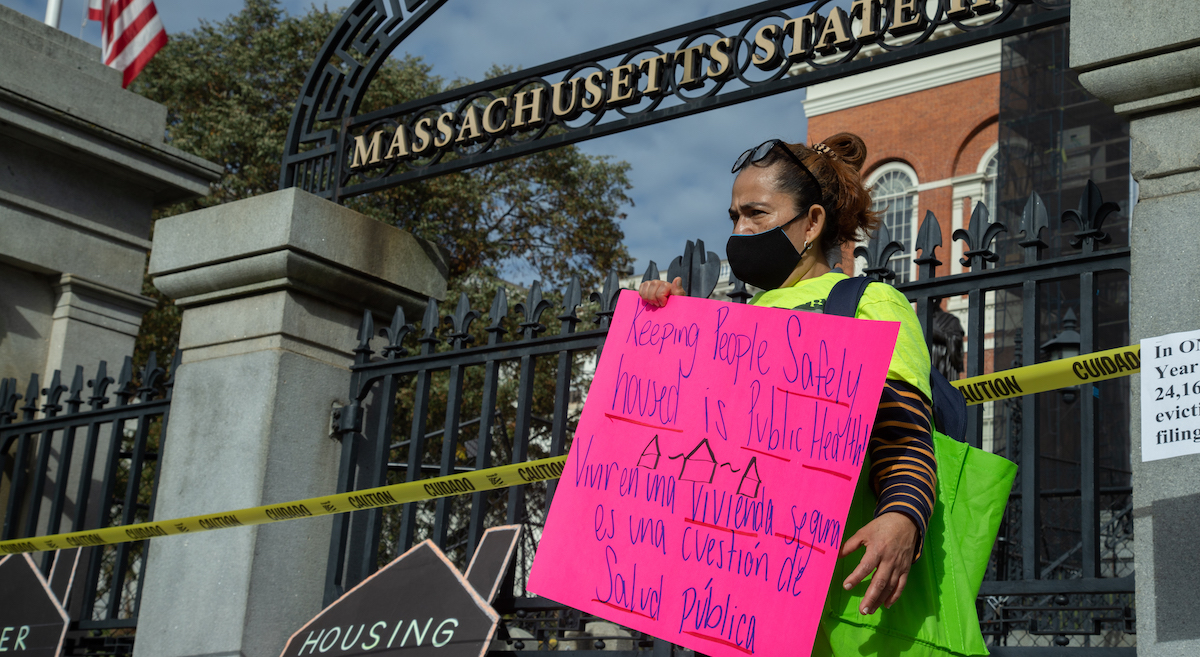latest
New Checks On Emergency Rental Aid Draw Protests in Massachusetts

By Chris Lisinski
Massachusetts renters who seek state aid to avoid eviction will face new requirements and a revised application process in less than a week, a sudden shift that prompted dozens of housing advocates to demand lawmakers intervene and stave off a “disgraceful and unnecessary outcome.”
In an attempt to stretch the hundreds of millions of dollars remaining in its eviction diversion program and steer them toward households facing the greatest threats, the Baker administration plans to amend how it decides which families receive rental assistance starting in the new year.
Most tenants will need to fall behind on paying rent for at least a month before they qualify for emergency aid, and all recipients will no longer be able to recertify their benefits for another three-month period without once again submitting a centralized application.
Housing advocates who work on the ground with at-risk renters argue that the move to ration dollars will displace more people and muddy the waters around who can access state support, all while Beacon Hill sits atop a mountain of unspent federal dollars.
Kelly Turley, the associate director of Massachusetts Coalition for the Homeless, said helping tenants in crisis should be “at or near the top” of the list for how to use the more than $2.3 billion in remaining American Rescue Plan Act funding.
“A lot of the concern is not only that the changes are going to go into effect, but that there really wasn’t much transparency or notification to households that are depending on this program,” Turley told the News Service. “The idea that the administration would move forward with changes without talking to the Legislature and asking for additional funds for emergency rental assistance seems very extreme and unnecessary, and disruptive to both households that are relying on the program and looking to access the program as well as landlords.”
The updated policies will hit the Residential Assistance for Families in Transition program, or RAFT, and the Emergency Rental Assistance Program, or ERAP, effective Jan. 1, 2022.
Both programs will begin requiring applicants to have at least one month of rental arrears, but not a summons or notice to quit, before they become eligible to receive cash assistance unless they are moving due to overcrowding or a health or safety crisis.
The Department of Housing and Community Development will also halt use of a recertification application that allowed households receiving ERAP dollars, which are doled out in three-month chunks, to extend their benefits through a less extensive process.
Moving forward, everyone who seeks another stipend will need to fall one month behind on rent and then reapply via the same central application they first used, though courts are still required to stay evictions if a defendant has a pending application for aid.
Andrea Park, a legal aid attorney with the Massachusetts Law Reform Institute, said she believes renters will be “incentivized” to miss a rental payment as a result of the changes.
“Incentivizing people to fall behind just makes it that much more likely that they are ultimately going to be evicted,” Park told the News Service, warning that landlord-tenant relationships could get “eroded” by longer stretches of unpaid rent while awaiting aid.
Through the fiscal year that ends June 30, renters will be unable to access RAFT funding if they have already exhausted their maximum ERAP benefits, which top out at 18 months of rental assistance and $2,500 for utilities. Administration officials expect that shift will free up DHCD to serve more new households that so far have not not received aid from either program.
Also effective Jan. 1, the maximum RAFT benefit for a 12-month period will drop from $10,000 to $7,000 under language in the fiscal year 2022 state budget.
DHCD Undersecretary Jennifer Maddox told stakeholders that the changes “are being made to preserve our resources as long as possible, direct funds to most vulnerable households that have not yet been assisted by our programs, and streamline processes at the Regional Administering Agencies (RAAs).”
“As we enter 2022, these changes give us an opportunity to stretch our existing state and federal funding to provide relief to as many low-income renters and their landlords as we can,” Maddox wrote in an eviction diversion initiative newsletter obtained by the News Service.
Maddox also said the administration would scale back its efforts to connect low-income individuals to legal aid in eviction cases to a “more limited basis.”
From the start of the COVID-19 emergency through November 2021, DHCD distributed about $411 million in rental assistance to more than 55,000 households across the Bay State, according to administration data.
Advocates say the state has spent roughly half of the about $800 million originally available for its rental aid programs. In a letter that Turley and dozens of other advocates sent elected and administration leaders last week, authors said the Baker administration has been notifying stakeholders that “ERAP is projected to run out of funds in just over six months.”
Additional federal dollars could be on the way, too. The Bay State surpassed a rental aid spending target built into the federal relief law, which empowered the Baker administration in Octoberto request additional funding from the U.S. Treasury.
An administration spokesperson said Monday that the federal government has not yet acted on that application.
Massachusetts launched its eviction diversion initiative in October 2020, drawing from both state and federal funding, when Gov. Charlie Baker allowed a statewide moratorium on evictions to expire.
In the wake of the moratorium’s end, more than 18,000 new eviction cases for failure to pay rent have been filed and more than 4,300 executions have been issued allowing a landlord to evict a tenant, according to state Trial Court data.
The public health landscape has shifted since then as well. The COVID-19 state of emergency is more than six months in the rearview mirror, and more than 5 million Bay Staters are fully vaccinated against COVID-19.
While vaccinations have helped limit hospitalizations and deaths, COVID-19 cases are surging once again as a result of the highly infectious omicron variant. Housing advocates sounded the alarm that rental aid program changes could snowball into transmission of the virus if more tenants are displaced and forced into crowded living situations with family members or in shelters.
Representatives of more than 160 organizations, including several regional housing authorities that have state contracts to administer rental aid programs, signed the letter to legislative and administration leaders calling for an immediate change of course and for injection of additional ARPA dollars into eviction diversion.
“These significant policy changes will add further confusion to an already complex process, causing more applications to ‘slip through the cracks’ and further destabilizing families over the holidays,” they wrote. “Taken together, these changes are likely to lead to an increase in eviction filings and displacement. With so much money available for emergency relief, moving forward with these changes would be a disgraceful and unnecessary outcome.”
Advocates also contend that the administration disclosed the impending alterations to the rental aid programs with little public notice and virtually no chance to receive feedback. Maddox’s newsletter to eviction diversion partners was dated Dec. 16, slightly more than two weeks before the changes will take effect.
“Without any opportunity for people to even understand how to plan for it, to make this change, it feels like it’s in secret,” Park said. “This is not the way we should be making program changes of this magnitude.”
Baker has said that he intends to file a bill some time in 2022 to use remaining ARPA funding on housing, environmental infrastructure and downtown revitalization, though it’s not clear whether or how emergency rental aid would feature in his plans.
Neither House Speaker Ronald Mariano nor Senate President Karen Spilka said Monday if they intend to steer more dollars into the ERAP and RAFT programs due for changes.
“Since the beginning of the pandemic, the House has prioritized affordable housing and rental assistance,” a Mariano spokesperson said in a statement to the News Service. “The deliberative approach to spending ARPA funds adopted by the Legislature allows greater flexibility to respond to the demands of a prolonged pandemic. As we enter another wave of the pandemic, the House will continue to consider funding requests from the public, ensure that ARPA funding is targeted to the state’s greatest demands, and that rental assistance dollars are prudently managed.”
A Spilka spokesperson added, “The Senate is proud of the unprecedented housing security measures and historic housing investments it has made throughout the pandemic. We will continue to work closely with our colleagues, the Administration and stakeholders to ensure those most in need during this public health emergency have access to the help they deserve.”





You must be logged in to post a comment Login